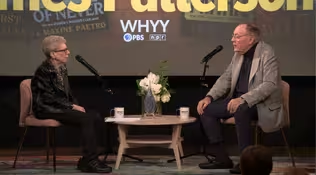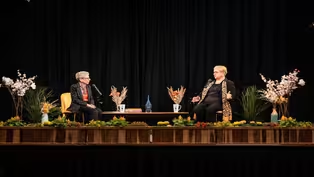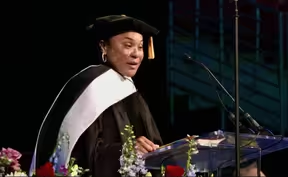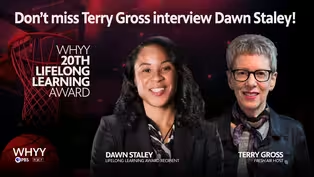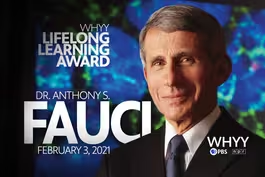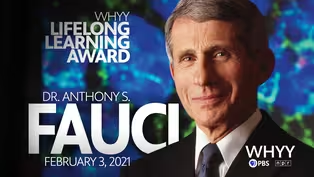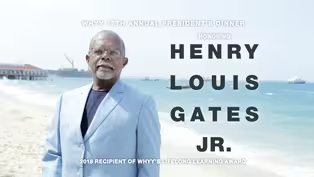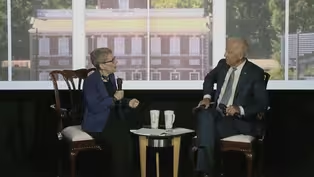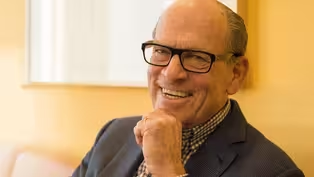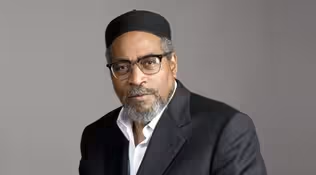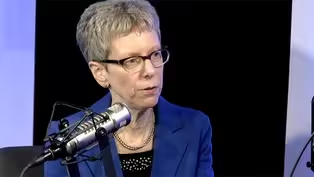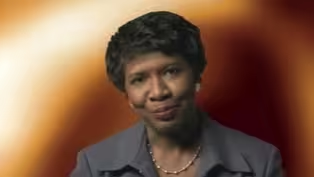
Yo-Yo Ma in Conversation with Terry Gross
Special | 58m 45sVideo has Closed Captions
Renowned cellist Yo-Yo Ma accepts WHYY's 22nd Lifelong Learning Award.
WHYY honors world-renowned cellist Yo-Yo Ma with the 22nd Lifelong Learning Award. This special event features an interview between Yo-Yo Ma and Terry Gross, host of Fresh Air.
Problems playing video? | Closed Captioning Feedback
Problems playing video? | Closed Captioning Feedback
WHYY Presents is a local public television program presented by WHYY

Yo-Yo Ma in Conversation with Terry Gross
Special | 58m 45sVideo has Closed Captions
WHYY honors world-renowned cellist Yo-Yo Ma with the 22nd Lifelong Learning Award. This special event features an interview between Yo-Yo Ma and Terry Gross, host of Fresh Air.
Problems playing video? | Closed Captioning Feedback
How to Watch WHYY Presents
WHYY Presents is available to stream on pbs.org and the free PBS App, available on iPhone, Apple TV, Android TV, Android smartphones, Amazon Fire TV, Amazon Fire Tablet, Roku, Samsung Smart TV, and Vizio.
More from This Collection
The WHYY Lifelong Learning Award recognizes an honoree who has demonstrated a passion for lifelong learning for themselves and for all those they can inspire. Previous recipients include President Joseph R. Biden, Dr. Anthony Fauci, Dr. Henry Louis Gates Jr., Gwen Ifill, Coach Dawn Staley, Lidia Bastianich and more.
James Patterson in Conversation with Terry Gross
Video has Closed Captions
Renowned author James Patterson accepts WHYY's 23rd Lifelong Learning Award. (27m 19s)
Lidia Bastianich: WHYY Lifelong Learning Award 2023
Video has Closed Captions
Chef, television host, and restaurateur, Lidia Bastianich accepts WHYY's 21st LLA. (28m 45s)
Terry Gross in Conversation with Dawn Staley: Full Version
Honoring Olympic gold medalist, NCAA-winning coach & Basketball Hall of Famer Dawn Staley (1h 27m 4s)
Terry Gross in Conversation with Dawn Staley
Video has Closed Captions
WHYY 20th Lifelong Learning Award recipient Dawn Staley interviewed by Terry Gross (28m 45s)
WHYY’s Lifelong Learning Award honoring Dr. Anthony S. Fauci
Special virtual event honoring Dr. Fauci. (1h 6m 50s)
WHYY’s Lifelong Learning Award: Dr. Anthony S. Fauci VIP Q&A
Special virtual event honoring Dr. Fauci. (1h 35m 4s)
WHYY’s 17th Annual President’s Dinner
Video has Closed Captions
WHYY’s 17th Annual President’s Dinner featuring Dr. Henry Louis Gates Jr. (28m 47s)
Video has Closed Captions
The 2017 WHYY President's Dinner honoring Joseph R. Biden, Jr. (56m 46s)
WHYY's 15th Annual President's Dinner
Video has Closed Captions
WHYYs 15th Annual Presidents Dinner Honoring Joseph Neubauer (28m 47s)
WHYY's 2014 President's Dinner, Honoring Kenneth Gamble
Video has Closed Captions
Proceeds from this distinctive event support WHYY's extensive educational initiatives (27m 20s)
WHYY's 2013 President's Dinner, Honoring Terry Gross
Video has Closed Captions
WHYY turns the tables this year and honors Fresh Air host Terry Gross. (23m 13s)
WHYY's 2008 President's Dinner: Gwen Ifill
WHYY's 7th Annual Presidents Dinner Honoring Gwen Ifill (26m 42s)
Providing Support for PBS.org
Learn Moreabout PBS online sponsorship(attendees applauding) - Thank you.
- The only honor greater than having Yo-Yo Ma here tonight is having Yo-Yo Ma with his cello here tonight.
(attendees laughs) So I'm absolutely thrilled about this.
So I want you to introduce your cello to us, 'cause it's from the 1700s.
This cello is older than the United States of America.
- Well, Terry, the first thing I wanna tell you is that the cello's name is Petunia.
- It has a name.
(attendees laughs) - Yeah.
And the reason it's named Petunia is because someone, I was playing in Salt Lake City in Utah probably about 25 years ago.
And a high school student whose name I still remembers, Brittany asked me, "Does your cello have a name?"
I said, "No, but I'll play you a piece of music and if you can think of a name, maybe I'll keep it."
And so I played a piece of music.
She said, "Petunia."
I said, "That's it."
(attendees laughs) And the name has stuck.
- One of the things you are famous for is one of the most famous series of compositions for cello, and it's the "Bach Cello Suites' unaccompanied, and you recorded them three times.
- Trying to get it right.
- Okay.
(attendees laughs) 2004.
- I can't remember dates.
- No.
I have it written down.
But you recorded.
- I did it once in my 20s.
I did once in my 40s.
- Yeah.
- I did once in my 60s.
- Yeah.
- So every 20 years or so- - 1983.
- I figured I might get it better.
- 1983 was the first time, 2018 was the last time.
So this was like, the "Bach Cello Suites" or the music that really first forefronted the cello as opposed to it being more of a background instrument, right?
- Well, it was written for cello alone.
- Yeah, for cello alone.
- So there was no background or foreground.
- Right, exactly.
- It had to be all ground.
- Exactly.
- Right?
(attendees laughs) - And they're beautiful pieces, but they were kind of discovered or rediscovered like after his death, long after his death, I think.
And some people thought, well, they're great like exercises, they're like technical exercises.
They're not beautiful music until Pablo Casals recorded it.
So I would like you to demonstrate the difference between playing Bach as a technical exercise and then investing your musicality in it and making it beautiful.
Because it's easy to think, "Oh, it's a kind of bunch of like grand arpeggios, some of it."
- Sure, well, I can play you one thing from Suzuki book five, which is, (lively cello music) (Terry laughs) which is great.
Everybody who plays Suzuki book five will play this piece.
But beret is a dance, right?
So you're thinking dance and a dance, a particular dance with steps.
And you know, the dance master would create a dance every week for people to dance on the weekends.
So people were really working hard at dances.
So (lively cello music) you put a kind of lightness to your step.
It turns it into something that titillate someone else's imagination to say, "Oh yeah, I can dance to that."
- Yeah, so can you just play part of the most, what is to you the most beautiful part of the "Bach Cello Suites"?
Just a short passage from it.
- Sure, so this is the very first piece of music I learned as a four-year-old.
("Cello Suite No.
1") You know, you may have heard this before.
(attendees laughs) And as a four-year-old, I learned it.
And what was interesting for a beginning cellist, if you look at this.
("Cello Suite No.
1") I just used one finger and it's the same pattern twice over.
So the first day of learning this piece was very easy because I just used my finger once, the pattern repeats, and the second day was I used two fingers.
("Cello Suite No.
1") Same kind of pattern with one change.
Everything we have in life is about patterns, the same or different.
Mommy, you look upset today, what happened?
We are constantly oscillating between the same and different, right?
And so it was easy for a child to learn things that had patterns to it.
And when it was different, it was interesting.
- Right.
- Now, why is this beautiful?
Well, as a four-year-old, I learned it, you know, fairly easily.
Kids absorb things as a sponge, absorbs water really easily.
After nine-years-old, you don't pick up languages naturally.
Actually start to analyze things, you use your mind, and it's a different process of assimilation.
So by the time I got to my 20s or 30s this piece became hard because how do I play it?
How do I?
And what I discovered, and what made it so beautiful for me is that whereas it was hard to start, but if I thought of an image of water of a brook or a river, and if I thought that the piece started before I began and I just joined the water, what it is about a river?
It's never the same river, but you always call it the same river, but the water's never the same.
So if I think of a water element, here's what it ends up sounding like.
("Cello Suite No.
1") You actually get to code infinite variety, right?
In a world where we can measure everything, or we think we can measure everything, how wonderful it is that you could have the poetry of music or poetry or music that actually makes you think you are touching infinity.
- You learned this when you were four, that's when you started learning the cello.
- And I'm 68, that means I've been trying to get this right for 64 years.
(Terry and attendees laughs) - Your father had this technique of telling you to learn and memorize two measures a day.
And that's what you did and that's how you learned it.
- That's I was demonstrating, yep.
- Yeah, so had you heard the whole piece before learning it?
Or was it just a bunch of notes to you?
- I probably heard the whole piece.
I think it's not unlike reading.
Kids love their stories, they want to hear it over and over again, and they can actually turn the pages before they start to read.
And they know when you try and shortchange them by skipping a page.
(attendees laughs) (laughs) Yeah, nervous laughter because we've all been there.
And so it's the same thing with a piece of music.
You kind of know it in your head.
You kind of know it tactically in your hands.
You kind of know it in your ears, but somehow, and you can read it.
And so over time, you're actually, you have a 360 version of what that music means.
It lives in your imagination.
It lives in as specific notes.
It lives as a symbolic thing of the same and different, it lives as a river.
- So Bach brought cello to the forefront, right?
And Beethoven did a lot for cello too.
Your latest album, "Beethoven For Three" is Beethoven music, I think transposed for violin, piano and cello.
- Yeah.
- Yeah.
So talk a little bit about, I want you to place something that you think was kind of groundbreaking in what Beethoven wrote for cello.
Just a passage.
And then talk about what made that important, what change that brought about?
- I'll give you one example.
He wrote a triple concerto, which is for violin, piano, and cello, and orchestra.
And at that time, the piano was always at the forefront.
His first two sonatas were written as sonatas for piano forte and cello.
And by the third sonata, it was sonatas for cello and piano.
And what's interesting is that, so the piano had the lead role.
The violin had also a lead role.
So he wanted to say the cello's an important instrument.
So in the "Triple Concerto" every single theme that is shared between the instruments, the cello plays first so.
(gentle cello music) And then the violin comes in.
So in the second movement, (gentle cello music) We have this gorgeous theme.
(gentle cello music) The cello starts at, the violin continues and the piano enters.
So he was just saying equal rights (attendees laughs) but it was a different kind of equal rights because the cello was kind of lower on the totem pole.
He says, "I'm gonna feature it first."
And it was a very deliberate compositional thing to do.
And after a while people kind of got the idea.
So they didn't need to do that anymore.
But he was the first one to really feature the cello as an equal instrument to the others.
- You were quite the child prodigy.
You were performing for presidents current and former by the time you were seven, right?
Kennedy and Eisenhower, do I have that right?
- I guess so, yeah.
- Yeah.
(attendees laughs) And Leonard Bernstein came and heard you, right?
So I'm wondering, when you're young and people are making such an amazing like fuss over you, like you're so extraordinary, do you risk becoming a praise junkie?
Because you get so much of it and that's maybe your measure of your worth in the world, you know?
But music isn't always about getting praise.
It's about finding like your voice within the music.
And I'm wondering, some people can't make that transition I think, some prodigies never find what's unique about their playing.
Because what was unique was that they were young and gifted.
- You make a very, very good point.
I never thought I was that special.
A lot of people paid attention to me and said, "You're this and you're that."
And I wasn't sure that that meant anything or was true or whatever.
But I was trying to figure things out.
I was actually very confused.
- About what?
- And about everything.
I'm an immigrant.
I was born in Paris, my parents were Chinese.
And guess what?
When we moved from France to America, our French friends would say, "Why you go to America?"
This is the greatest country in the world, you know?
(attendees laughs) Well, and once we arrived in America, like Americans say, "Well, this is of course, the greatest country in the world.
You've arrived."
(Terry and attendees laughs) And my parents would say, "Well, there's Chinese culture, you know, ancient culture.
This is so great."
And I was wondering, then why are we in America?
(attendees laughs) So I was very confused because people would say, "Choose.
You must be one or the other, whatever."
And I thought, why, why do I need to choose?
Because I love croissant.
(Terry laughs) Do I have to give up croissant for wonder bread, you know?
And I don't mind rice either, but I love potatoes too.
Do we need to make a choice on everything?
- Did you have a chance to be a child when you were a child?
'cause you must have spent so much time practicing.
- I am living my best childhood right now.
(Terry laughs) (attendees applauding) - One of the things I find really amazing about (Yo-Yo laughs) your life story is that you were so disciplined as a child.
I mean, 'cause you were learning so much stuff.
- I'm still disciplined.
(laughs) - But you went through this period of actually rebelling.
I mean- - I'm still rebelling.
(Terry laughs) - Are you?
- Yes, of course.
I'm rebelling against people doing things and not knowing why they're doing it.
I'm rebelling against people saying, this is the only way to go.
I'm rebelling against people saying this is right and this is wrong without ever explaining why.
- Yes, but when you were rebelling in school, you were cutting classes.
- Yes.
(attendees applauding) - In Julliard, you were sneaking up between orchestra breaks to get alcohol.
- Absolutely, absolutely.
- And got really drunk and went take to the emergency rooms.
- Who wouldn't do that?
- To the emergency room once?
- Absolutely.
- Yeah.
- And my father had to check me out of the hospital because I was 15 years old.
(Terry and attendees laughs) - You had a fake ID.
- Yes.
(attendees laughs) - He could not have been very happy, happy about that.
- All those things, no.
He gave up drinking because like guilt, shame, all of that stuff.
- Your father gave up drinking 'cause he was a bad example.
- Yes, because he thought, you know, 'cause my mother said, "See, you're a bad example for your son."
(Yo-Yo and attendees laughs) It was horrible.
- Were you punished?
- Well, the shame and guilt was like if that's not punishment enough, it's like my father's only joy was a glass of wine.
He gave that up.
Yeah, right?
You see, I see everybody's.
(attendees laughs) - So was there a piece where you felt like you really found your voice as an individual, as Yo-Yo Ma as opposed to just like, somebody who's incredibly talented, but this was your voice, your unique voice.
- That's a very interesting question.
It implies that we all have a consistent one voice.
And I dare say that all of us of a certain age have multiple voices.
- I think that's really literally true.
- You think that's true?
- Yeah, I think it's literally true.
- Yeah, because we were talking earlier about what you, Terry and I, Yo-Yo try to do is to make sure that at every stage in life that we acknowledge that stage and not try and pretend we're another stage except for me, I'm still living my childhood.
But that's different.
(Terry laughs) That's an exception.
But I would say that like this music, (gentle cello music) This is a Sonata by Schubert.
When I was 10, I was mesmerized by Schubert.
And one of the things about Schubert that was amazing to me, and I think it appealed to me as a 10-year-old was that in the happiest moments, there's sadness.
And in the saddest moments, there's a glimmer of light.
And I think that, it's the gray, right?
But it's not constant gray, but it's like British weather sunny, sunny, (Terry and attendees laughs) sunny spots.
(laughs) And I think that's a lot of life.
And I think as an immigrant, right?
You're always aware of being able to be on the inside and the outside.
- Sure.
- Multiple times.
And I think today, all of us are on the inside and outside of something multiple times a day.
- How does the piece you just played relate to that?
- It has that poignancy, it has that wistful quality and you're yearning for something and it could be towards one way or another and whatever, but so that's something that was, but I can tell you something else that when I was 19.
In college, they had an orchestra, and I was asked to learn a piece of music that at first I was terrified or didn't even like, but I was incredibly attracted to it.
And this is this piece of music.
I'll play a little bit of this.
(energetic cello music) So this is.
- Oh, I love that.
- You love that, huh?
- Yeah.
(attendees applauding) - Okay, well.
- I love the turmoil of it.
- Yeah.
So this was sort of in a way going to the dark side (attendees laughs) and it's a piece that was written at the height of the Cold War, Shostakovich, social realism depicting literally that very thing in society.
And it's funny how we get so naturally into certain music like that.
Schubert I loved as a 10, 12-year-old, but for the Shostakovich, I wasn't born in the Soviet Union.
I did eventually visit the Berlin Wall and saw all what people went through to cross the Berlin Wall with all flowers, placed every 50 yards for somebody who tried and didn't make it.
But it was through reading a book about Shostakovich, who I think devoted his life to advocating for the voices of people that were part of that system.
And what is interesting is code, everybody knew in Russia, in the Soviet Union knew what that music was about.
And it's harder to censor notes than words, but the messages were absolutely clear, right?
So once I understood that that was the kind of advocacy, it's no longer about my voice, but it's about my advocacy for the voices of people that didn't have the voices anymore.
- And that leads me to that you've performed at several very important commemorative events.
You performed at the first anniversary of 9/11 at Ground Zero.
You performed at an anniversary for the Boston Marathon Bombing.
You performed in France by the Arc de Triomphe in commemoration of the end of World War I.
And very recently, you performed for Jose Andres' World Kitchen, which provides food for people in natural disasters and in war.
And seven of his people were killed in Gaza.
And you performed at the ceremony, the commemorative ceremony for them.
I would like you to talk a little bit about choosing appropriate music for such grave occasions and how you figure out what to play that will give people, that will enable them to fully and deeply feel their grief, while also providing some kind of consolation and community.
And maybe you can play an excerpt of one of those pieces that you think speaks to that kind of need.
- Well, I think the playing at the National Cathedral is always a special thing because that's sort of like the national place for commemoration, for mourning, for celebration.
It's more than the Episcopal church.
It's a national place, right?
And I think they did an incredible job of acknowledging an unbelievably complex situation.
- The Jose Andres commemoration?
- Right, so there were seven people that were killed.
There was a Polish man, Damien, there was a Palestinian, there was an Australian, there was a Canadian.
And so the killings occurred in Israel in Gaza.
And Jose Andres spoke, I thought in such a way that threaded the needle, acknowledging the 200 aid workers that have been killed.
The 34,000 people, the 1,200 people, and it just kind of, and he spoke individually for each of the people from the World Central Kitchen that died.
So I started with this (gentle cello music) Ernest Bloch's.
Ernest Bloch from Jewish life, followed by this piece from Adnan Saygun who was the first national Turkish composer, Adnan Saygun, that add Turk appointed.
(gentle cello music) Followed by (dramatic cello music) a Bach sarabande that actually originated in Africa, moved to Spain, was banned in Spain, moved to France, moved to South America, all as a dance.
And then taken by Bach in what was not yet Germany at that time, that crossed all these boundaries.
But a dance that started out, that was danced by Bedouin women.
And you know, through music, you're crossing all those lines, six minutes of music and somehow you can evoke the sense of place, of time, of, you know, of just having been.
- [Terry] What were you thinking as you were playing at that ceremony?
- [Yo-Yo] I was looking straight into the families of the workers.
I was looking at Jose Andres.
- As you were playing?
- Yeah, I looked at Douglas Emhoff's eyes, who recognized, I think the first tune.
There's so much that we do that we live through every day.
That's actually a very fine line between the secular and sacred.
It's your choice.
You look at another human being that's a sacred person.
You look at a plant, you breathe, it's your choice on where to put your mind and heart.
We may not be able to do a lot, but we can actually practice intention, and music helps, just put us into that frame where it becomes more possible to think certain thoughts.
- Yeah, that's so right.
- It's just doesn't say- - Yeah.
- Do this.
No, we're not saying anything.
But rather if you are in that same sort of flow of thinking, and that's why music is a communal thing, right?
It can get us to get to the same frame of mind so that we emerge from an experience or one of your interviews.
I emerge from one of your interviews feeling, you know what?
Here is one person who is curious about another individual.
Spend time thinking about that person reacted spontaneously to what that person was saying, was prepared, cared, and was respectful and was non-judgmental.
It doesn't get better.
- That's a very generous thing to say.
(attendees applauding) - You can smile.
(attendees applauding) - One of the interesting things about classical music is a lot of the European music was basically commissioned by the church and is commissioned like the right word.
Or like they were, the church was the sponsor.
- The church had the power- - And the money.
- And so it made the, yes.
- Yeah.
- The rules of what, but also I think the cathedrals, the Sundays were filled with everything.
Animals, people, I mean, it's not like church as in, oh, this is like, no, it was everything.
And so my sense of spirituality or whatever is, it's sort of like, remember I started off playing this piece that I said.
("Cello Suite No.
1") - Yeah, yeah.
- Right?
Water, infinity.
You know, what is infinity?
You go to physicists, you go to religious leaders, you go to, I just think that there is a space for each human being where the almost inexpressible part that is sacred secular, that is immeasurable or harder to measure than the things we're used to measuring can exist, and we know it exists.
It's just hard to quantify.
And I think that's part of the space that music occupies.
I'll give you an example.
During the pandemic, frontline workers, people who were in hospitals who could not see any of their relatives that were at the end of life, they could be given an iPad where you could play music.
Now, if you touch an iPad, and music comes out, you can feel the vibrations, right?
You can feel it coming out of your phone.
Music is energy.
It moves air molecules.
It's the closest thing to not only hearing but to touch, air molecules touches the skin.
And I thought to myself, yes, the commemorations, the public stuff, but ultimately, it's the private stuff.
One of my jobs is not just to play weddings and bar mitzvahs and memorial services, (Terry and attendees laughs) which I do, (attendees laughs) but it's to actually acknowledge someone who is beyond the care of medicine and they're still very much alive, but maybe not for long.
The dignity of that human being is something I want to address as is the dignity of every child or any adult or any teenager.
That's the part I want to touch.
And my job is to try to the best of my ability to actually recognize that as I think is what your job is.
- Well, if only I could do something as exalted what you did- - It's the same thing.
- But.
- You get into, you get into the hearts and minds of everybody you try to interview.
I try and get into the hearts and minds, not only of the composers that I study and try and advocate for, but we talked that earlier, is that the most important person in the room when we're activating our profession is actually the person that we're trying to reach in the room.
- Is there a piece that you like to play for yourself when you're alone and you need some kind of consolation or you need to feel something larger than yourself, you know, to connect to something larger than yourself that gives you what you need?
- I will go often, to Bach, are you asking me to play something?
- Yes, I am.
(Yo-Yo and attendees laughs) - Why didn't you just say that?
- I thought I did.
I thought I did.
(Terry and Yo-Yo laughs) - No, no, I mean, I thought you wanted some information as opposed, you wanted some action.
- Yes, exactly.
- Okay, so fine.
Alright, so tell me, how much time would you like me to play for, because that's what I do for weddings, right?
You kind of you see how, the bride comes in, the groom is there, and it's like you figure out how long it was and then you add another 20 seconds.
So you go on television says, no, you can't play for 2 minutes and 45 seconds.
It has to be 2 minutes and 25 seconds, and that's it.
We cut you off.
So how long would you like me to play for?
(attendees laughs) - Well, because I'm selfish and wanna keep talking with you.
I say 90 seconds.
Would you like me to take a stopwatch for you?
- Sure.
- No, I'm kidding.
I'm kidding about the stopwatch.
Tell us what it is.
Oh, it's "Tis the Gift to be Simple".
("Tis the Gift to be Simple") ("Amazing Grace") ("Amazing Grace") ("Going Home") ("Going Home") (attendees applauding) Whoa.
(attendees applauding) Okay.
(attendees applauding) That was beautiful.
And we started with, "Tis the Gift to be Simple," went to "Amazing Grace."
I don't know what the third piece was.
- Well, that was actually the "Going Home" from Dvorak.
- Oh.
- Which is from his New World Symphony was also- - That's so beautiful.
- Yeah.
It also turned into a spiritual going home and so it has a number of iterations.
- But the way you kind of found chords, you know, on the cello and oh, that was just beautiful.
- Well.
(attendees laughs) - Can you talk a little bit about why those pieces are significant to you?
- Just before I started playing, I said something like, we are all more than who we think we are, right?
Because there's always unexplored parts.
And I think with music, with anything that's created, if you look deeply enough into anything, I think you actually see the world.
"Simple Gifts" Shaker song, right?
Then Aaron Copeland turned into Appalachian Spring.
Boom, suddenly had a different Life.
And we may know that song partly because of Appalachian Spring.
And then again went back to saying, "Oh yeah, that's a Shaker Song.
- Right.
- Right?
You know, "Amazing Grace."
It's a song that's been spiritual adapted from, it was, I forget the name of the person who was actually not a very religious person who wrote this, but he was in a storm and he survived and then became very religious.
And there's a long story to that.
And of course, today, "Amazing Grace" has so many places where it is, core music for many social human occasions.
Dvorak, had he not come to America, had he not met Harry Burleigh, who introduced him to spirituals, and Dvorak upon hearing Harry Burleigh's voice and became friends with him, who just showed him all of this music and said, you know, this African American music, the spirituals is as great as any music I've ever heard.
This is the Soul of America.
And he taught his students to say, so Dvorak was hired by Mrs. Thurber to come to the United States to be the head of the American, the National Conservatory of Music in New York City for a number of years.
He stayed only about three years.
And during this time he taught, he taught Harry Burleigh, he taught many students, and he told the students what?
He said to them, "Don't teach like me, don't compose like me, don't imitate me, but listen to what's around you."
Listen to the music of immigrants, listen to African American music and the Native American music.
He traveled to find all of this.
He said, "This is where you're gonna find the soul of America."
And his students taught their students that way.
And they became George Gershwin, Aaron Copeland, and Duke Ellington.
- Wow.
(laughs) (attendees applauding) Everything you've said leads to the Silk Road Ensemble that you created, because that's about bringing together musics, cultures, and musicians from different parts of the world and finding common music in the differences, finding a way to play together through the differences.
And could you talk about, and play for us an example of something that you learned as a musician through interacting with all these musicians from other cultures.
It might be a way of bowling, it might be a melody or a time signature or a tonality.
But something that you wouldn't have come to without that.
- So remember we talked about things that are patterns, similar things and different things, right?
- So I think, isn't that what we do when we meet people we know as well as people we don't know, right?
So one of the things, I'll give you an example of something that we know.
Alright, so here's something that you might recognize.
(gentle cello music) So that's white music.
I'll play another thing.
(dramatic cello music) Okay, does it sound the same or different?
- Different.
- Different, okay.
So what's the same about both pieces?
There's a drone underneath both of them.
(dramatic cello music) Okay, so the drone for bagpipes, for funerals, you know, policemen dies, bagpipe comes in.
Weddings, drones.
For instruments that can travel.
Fiddlers from Scotland, Ireland, Denmark, drones for the morin khuur, the Mongolian horsehead fiddle.
Portable.
You could take it everywhere and accompanies you for all that you need to express in life, right?
So that's a commonality.
Now.
(dramatic cello music) Earlier you heard me play.
(dramatic cello music) I could play.
(dramatic cello music) I can also play.
(dramatic cello music) Is that the same or different?
Is it slightly different?
- Yeah, slightly different.
(dramatic cello music) - Does it sound in tune or out of tune?
(dramatic cello music) Now if you play the piano, you'll say, wait a minute, I can't find, (dramatic cello music) you'd hear this on the piano, (dramatic cello music) but I'm playing it.
(dramatic cello music) You could say, this sounds out of tune.
You could say, it sounds beautiful.
You could say, it sounds expressive.
You could say, it sounds exotic, right?
It's just slightly higher than what you would find between two notes on the keyboard.
Now if you like that it's yours.
If you don't like it, you can say, "Well, it just sounds weird," or it sounds different, or it sounds exotic, your choice.
But if you happen to like it or you change from saying, it sounds weird to saying, "Ooh, I like that.
I want it.
I actually need it."
You've just turned something that was other into yours.
- In classical music.
- Wait, let me finish.
- Okay, go ahead.
(attendees laughs) - No, no, just one thing.
- Yeah, yeah, yeah.
- Because to me that's what we're missing in the world, which is culture.
And by culture I mean something.
Not like, oh, culture, you must go to the symphony.
No, it's not.
But it could be that.
Or you must read more.
The idea is that culture is what allowed me as a 19-year-old to turn myself from someone that didn't understand what was going on in the Soviet Union.
And through reading and through a piece of music, become absolutely an advocate for 20 million people who died.
Let's not forget that Stalin said, "One death is a tragedy.
A million deaths is a statistic."
Those of us that deal with statistics, or those of us that ever have had to fire anybody, they say, if you don't feel anything when you fire somebody, or when you make a decision on statistic without feeling the impact, we lose a bit of our humanity every time we do that.
That's not to say we don't have to make hard decisions, it's about what it takes to make hard decisions and how to make good hard decisions means that we have to use our brains, our hearts, and everything that we have valued in a consistent way.
I'm done.
- I wanna get back to what you just played.
(Yo-Yo laughs) (attendees applauding) (Yo-Yo laughs) (attendees applauding) I had asked you about what you'd learned from Silk Road and from being exposed to music from so many different cultures and musicians from so many different countries.
And you played something with drone and with bent notes.
Were you not playing that kind of music before?
- No, I wasn't.
It's so funny because you identify, so, oh, you did Silk Road, but life happens from tiny little decisions that are kind of progressive and then occasionally there's something that becomes an outward, oh, so you did this.
Well, what led to that?
I first got fascinated because I went to Stephane Grappelli's 80th birthday concert.
- Oh.
- And I heard- - The great jazz violinist.
- Exactly, I heard Mark O'Connor play.
And I said to Mark says, "Wow, this is unbelievable.
Can you teach me what you do?"
And then I met Edgar Meyer when he was 17 years old or 19 years old, and I said, "My gosh, I've never heard a bass player sound like this."
And then I dreamt of Mark and Edgar get together with another cellist, Ernst Reijseger in Holland that I thought they would make a great trio.
I sort of tried to set them up and they never became a trio.
And once I had to do a benefit concert, I said, "Look, do you mind if I, let's try to do this?"
And said, "Okay, we'll teach you, we'll do this, but we have to meet for every month for a year, and then we'll do this concert."
And the second month in, we were playing some music.
I said, "That sounds really cool.
I think we're sounding great."
Silence.
(attendees laughs) They thought it sounded awful, because of intonation.
I was playing the intonation that I was used to, but the filling intonation is in between what we're talking about, the bent notes and the piano intonation that I'm used to.
So there's something prior to that and in between, and by the time you get to Persia, you get, instead of the major and minor scales, you have like 36 different scales.
The ears are tuned differently.
They look for different things.
So that's the thing that, and it gradually I started to understand, oh my gosh, it's not this or that, but that's all the stuff in between.
- I wanna end by paraphrasing something that you've said, and I think this was in reference to recording the Bach Cello solo pieces three separate times.
And you said that your approach was, this might not be perfect, it might not be the best performance, but it's the best I can do in this moment of my life.
And I find something really beautiful in that 'cause it expresses the commitment of doing your best in that moment, but it also has a kind of forgiving attitude that like, it's not gonna be perfect, but it's the best I can do right now, and that that's gonna be good enough.
I think that's a beautiful approach to things, to the music and maybe to life.
- I think to me, that's been my experience of your approach over the last 40 years.
- Oh, please, (laughs) thank you.
- No, seriously.
Because you know, I was gonna ask you, how do you deal with burnout?
How does anybody who does things for four decades avoid the trap of saying, "Okay, I'm caught in a rut."
How do you rejuvenate, regenerate and constantly be curious and active and do your best?
I try and forgive myself because I don't wanna be neurotic.
I also don't want to fall under the spell of what I call an industrial aesthetic, which is your way of saying perfection, right?
What do we do in industry?
You make a million copies of something with the least amount of error.
So we use a million copies.
Maybe it's six out of a million bad, right?
I can't play a million concerts and have six bum concerts.
That's an unreasonable thing to ask of a human being.
What allows me to not be paralyzed is to just say, I'm doing my best.
(attendees applauding) - You are magnificent and generous.
You honored us with your presence.
I thank you so much for this.
I will always remember tonight.
- I love you, Terry Gross.
- I love you.
I love you.
- You're our hero.
(gentle cello music) (attendees applauding)
Support for PBS provided by:
WHYY Presents is a local public television program presented by WHYY
